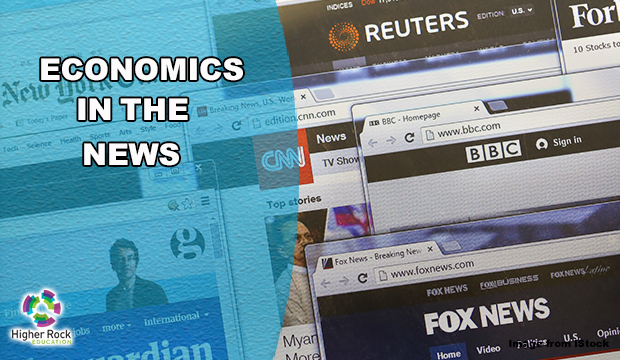Economics in the News – Feb 7-13, 2022
Economics impacts our lives every day. Below are some of the top storylines from this past week related to economics.
- For five days, protesters have blocked traffic at the Ambassador Bridge, the busiest border crossing between the United States and Canada. The demonstrators were moved to protest a federal government requirement that truck drivers be fully vaccinated if they wanted to avoid the 14-day quarantine upon re-entry from the United States. Demonstrators in Ottawa and other areas throughout Canada are demanding to end all COVID-19 vaccine mandates and other restrictions.
The Ambassador Bridge connects Detroit and Windsor, Ontario and accounts for 25 percent of all trade between Canada and the United States. An estimated $328 million in goods cross the suspension bridge each day. With crossings shut down, plants on both sides of the border have had to go offline or operate at reduced capacity. [Associated Press]
- What was your favorite commercial during Super Bowl LVI? Super Bowl broadcaster NBC sold its commercial time for as much as $7 million for a 30-second spot. That is an increase of 27 percent from last season with 40 new companies buying advertisement space.
With the game’s enormous reach of more than 100 million viewers, the Super Bowl offers companies an opportunity to generate awareness. This year’s game marked the first time that crypto companies purchased ad space, drawing comparisons to the early 2000’s when dot-com companies bought ads. They hope to fare better because most of the dot-com companies didn’t survive the year. [FORTUNE]
- Hosting an Olympic Games is costly and makes little economic sense for many international cities. China has set a budget of $3 billion to host this year’s Olympics, including the building of competition venues and paying for staff. However, that figure does not include the necessary infrastructure to travel between sites. For comparison, the city of Sochi invested more than $50 billion to host the 2014 Winter Olympics, half of which was on infrastructure.
China also sees an opportunity to build an interest in winter sports, such as skiing, curling and hockey that could increase consumer spending in its economically struggling northeast.Outside of costs, China leader Xi Jinping hopes to display his country’s unity to the world. [The New York Times]
- Many small, rural regions, such as Tennessee’s Upper Cumberland region, have struggled for decades are now seeing a revival of their towns. The boom is coming from new residents coming from more expensive areas for a reasonable cost of living.
The COVID-19 pandemic accelerated the growth for the area, as workers left congested areas and are able to work remotely. Further growth in remote work, could fuel a further exodus of the larger cities due to the price advantages. [The New York Times]
- Want to open a business? Move to Denver. The Mile High City wants to revive its downtown area and plans to provide free rent and services up to $20,000 for five businesses to open-up shops in unused retail space. Four of the sites are being offered as retail spaces, while one will be used for an “art activation.”
With Americans shopping online, closures have mounted in not only Denver, but across the United States. Investment Bank UBS projects 80,000 stores to close between 2021 to 2026. [Business Insider]
